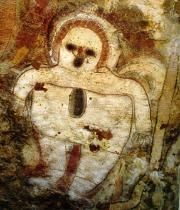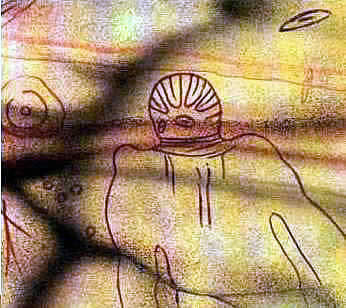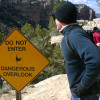It is simply not reasonable to believe that a god or gods exist.
The belief in supernatural deities, whether in the fashion of the original monotheism of Aten (Judaism and Islam), the polytheism of Christianity or the animism of the ancients is a contradiction to Man's ability to reason.
There was a time when Man, limited by knowledge, looked to the sky, himself and existence and reasonably answered the questions with supernatural beings, just as he knew the world was flat and the earth and Man were the center of the universe. That time has passed and as a child puts away the childish things of youth and matures, so too, must the gods be put in the past and we must accept the responsibility of life as our own responsibility.Emotions, denial and a preferred state of bliss.
It's the fool who denies god, so says the wise of religion and the religious prefer to remain fools for god. The wise pocket the money.
We strongly believe things we have lots of supporting evidence for, but we "know" things we have experienced. So it's a misnomer to say that committed Christians, for example, "believe" in god. To all intents and purposes, committed Christians know god exists by virtue of the fact that they have (apparently) experienced god (feeling forgiven, supported, chastised, loved by god etc.) No "evidence" (and therefore reason) is required at all.
But the same internal mechanism that grounds god-belief in apparent experience, can be seen at play in other beliefs. You don't "believe" you had toast for breakfast yesterday, you know you did, by virtue of the fact that you (apparently) experienced it. That "knowledge" is not formed on the basis of evidence (requiring reason), it's grounded in your (apparent) experience.
So, playing devils advocate (so to speak), while it's true that God belief is unreasonable, so what? Are you saying that beliefs not formed on the basis of reason are not valid beliefs? If so, what does that mean for all the beliefs people hold that are grounded in personal experience. Are all those beliefs invalid? Moreover, if those beliefs are all valid, does that mean, ipso facto, god-belief is valid?Yes, we all experience many things, and form beliefs from them. We see a UFO and believe in aliens abducting us. We see a man cut a woman in half in a box and wonder where the blood went. My grandson "saw" his parents on TV during a football game, then seconds later "saw" them again on the opposite side of the stadium.
Such things are why we (some of us at least) test our experiences, observations and conclusions before declaring them to be true and real. And sometimes we don't because we want the conclusion whether false or true: "my wife loves me", maybe, or "there is a god that loves me and watches over me".We automatically assume our senses are reliable, unless we have good reason not to, and we react to things on that basis. So yes, people who genuinely (apparently) experience UFOs (as opposed to people who are lying/ dreaming/ hallucinating etc.) do genuinely believe they have encountered a UFO. Likewise, anyone with no prior knowledge of illusionists/magicians etc. who (apparently) see a woman being sawn in half, will (rightly or wrongly) believe they saw a woman being sawn in half.
We are inclined to trust our senses because that helps us survive (better to react quickly to perceived danger, and be wrong, than to not react, and be dead). That's why this 49 second film from 1895 had people screaming and jumping out of their seats because they thought a train was coming through the wall.
The audience belief they were in danger was not formed on the basis of evidence (reason). It was grounded in the experience of (apparently) seeing a train coming. The fact that they were mistaken about what they were experiencing is besides the point. The point is that those people behaved as any rational person would if they genuinely believed a train was coming towards them.
Likewise, god-belief is often not formed on the basis of evidence/reason. It's a reaction to an experience or set of experiences. Whether people are mistaken about the nature of those experiences is besides the point. The point is that religious people are reacting as any rational person would if they genuinely believed they had experienced the forgiveness/love/chastisement/mercy of an all powerful, all knowing, omniscient being.
The only difference is that we are able to explain the experience of "moving pictures" because that falls within the realm of natural science. So despite what we see on a screen, we know not to trust our senses in the cinema. But even then, we still feel scared, sad, or angry when watching a film, even though we know what we are seeing is false, such is the power of experience.
In terms of religion, although we can address religious claims that fall into the domain of science, like bleeding statues etc, the nature of the most fundamental claims about god, mean we are unable to address the question of gods existence. So unlike other experiences that we know are false, we cannot categorically say that religious experiences are false, which takes us back to the first sentence. We automatically assume our senses are reliable, unless we have good reason not to, and react accordingly. Religious people are absolutely no different to anyone else in that regard.Just so. Experience is not that good of a guide when something strange or different happens and we simply apply an explanation or cause to it without ever testing. It's one thing to jump out of a movie seat in terror (fight or flight); it's quite another to have days or years to think about the experience before drawing conclusions. And believers do not - they apply a conclusion that fits with a pre-made belief without ever testing it for veracity. It is viewed as evidence, but is not.
Just to clarify, Christianity is not polytheism. There is only One God. He exists in three personages, Father, Son and Holy Spirit. Not trying to debate or argue, just trying to set that point straight.
SirDent
You certainly have a right to believe whatever you wish, but believing something is true or factual does not make it so.
As to how this doctrine came about, I would suggest a reading or research of the Council of Nicaea and the opinion and influence of Constantine on the Council.
The trinitarian doctrine of Christianity is not original with Christianity, but as most things Christian are taken from more ancient pagan beliefs. Arguably, the Christian Trinity is a copy of the Egyptian mythology of Ra as noted here, "Egypt’s history is similar to Sumeria’s in antiquity. In his Egyptian Myths, George Hart, lecturer for the British Museum and professor of ancient Egyptian heiroglyphics at the University of London, shows how Egypt also believed in a ‘transcendental, above creation, and preexisting’ one, the god Amun. Amun was really three gods in one. Re was his face, Ptah his body, and Amun his hidden identity (24). The well-known historian Will Durant concurs that Ra, Amon, and Ptah were ‘combined as three embodiments or aspects of one supreme and triune deity’ (Oriental Heritage 201). Additionally, a hymn to Amun written in the 14th century BC defines the Egyptian trinity: ‘All Gods are three: Amun, Re, Ptah; they have no equal. His name is hidden as Amun, he is Re... before [men], and his body is Ptah’ (Hornung 219)." http://www.heraldmag.org/olb/Contents/d … rinity.htm
Just trying to answer the main question briefly; God may or may not exist, but the fact remains that believing in God helps the believers in many ways, one of these ways is: because God is hope for those that need hope most.
Lots of things. I doubt that your Hope lies solely on God. Does it?
God holds it all in His hands. Would you mind being a little more specific?
I have hope in the future, hope in myself and my capabilities, hope in humanity and the beauty that can be found in it for everything ugly. It's a very broad question. I find hope in every aspect of life.
You are right, it is a broad question. Where is your hope when sickness hits?
When you are hungry and unable to buy food?When I get sick, I'm hopeful that I've been sick before, and gotten well. I remember that pain doesn't last forever and that there are people who love me who will help me. When I'm broke and hungry, I'm hopeful that there are lots of god people or there that help people who are hungry, and that help is available. I remember the people that I've fed, and am hopeful that they're doing better, and hopefully helping someone else in need somehere
Thanks for answering. I will let you alone now.
Overall, I hope that in some small part, I can leave the world a slightly better place than it was when I entered it. No matter how bad it gets or how dark it seems, I remember happiness and hope to feel that again, knowing that I can survive and it will get better. Thanks for asking.

Argumentum ad lapidem. You have written that it is not reasonable, yet have made zero argument for your claim.
When you use the word "exist" in your title, do you mean exist like Christopher Hitchens exists?
What is the reason for reality?Phoenix
I have never met Hitchens and have not heard him talk or have I ever read anything authored by him. I do not understand your question here. Are you trying to say that Hitchens would be on the same level as a god?
As to your question, "What is the reason for realty", I am not sure of the context here. Are you speaking of the universe, how you define realty or how another may define realty?
Energy and matter exists, this we know and there are many theories as to it's origin. Would you like to place your belief in such a category?
Such theistic beliefs are lacking because there is no rational cause to believe that any claim or purported evidence is credible. If you would like to put forth a reasonable argument or evidence, I would be delighted to respond.Christopher Hitchens' self awareness used to exist. Now it does not. Can we conclude that some things exist and then cease to exist? Is that what you consider "existence" - things that do not exist? That is a contradiction. Do you believe that "exist" mean sometimes it does, sometimes it doesnt? Or only when it exists does it exist. It did not exist before, it existed for a short period, then it ceased to exist. Why does anything exist at all then?
What is the reason for contingent things? What is the reason for reality? What is the reason for causality? Your position is to discount/dismiss certain potential truths, without merit, unless you can answer these questions.The onus is still upon you. But indeed that is what I or we are doing. It is what we are doing right now.
Based on what exactly? Your experience? You have heard all the arguments and decided? You have made no argument so far. You wrote : "That time has passed and as a child puts away the childish things of youth". Is that a Bible verse? 1 Corinthians 13:11? It is a nice verse, but has no merit as an argument here.
Why is there reality, causality, contingent things, logic, you name it? Why? What is the reason? What is your rational explanation? If there was no reality, we would need no explanation. Why is there reality instead of no reality?Evidence of what Mr. Cjhunsinger? Something we can kick the tires on? Put a gallon of gas in it and fire it up and see how she runs? We have a universe of that stuff. We are looking for a reason for that stuff, and it cannot logically be more stuff or we will need another reason, we don't need evidence of more stuff.
Where did the universe come from? According to established science it did have a definite beginning. And according to the Principle of Causality it therefore required a cause. That cause could not have been "natural" because the natural realm which forms the substance of your fundamental assumptions did not exist.
"Established science' doesn't know a whole lot about the beginning of the universe. We can only see and measure to about 300,000 years or so after the Big Bang. What was in the "singularity" at the beginning? What laws of physics were already present and active? We don't know. Maybe there wasn't a beginning to everything.
"Established science' doesn't know a whole lot about the beginning of the universe. We can only see and measure to about 300,000 years or so after the Big Bang. What was in the "singularity" at the beginning? What laws of physics were already present and active? We don't know. Maybe there wasn't a beginning to everything."
This is where a superficial advocacy for established science and logic takes a sharp turn toward an obsolete naturalistic ideology and blue sky speculation, but that's okay. It's SOP when the established facts of science and correctly applied logic clash with the absolutist strictures of naturalism. The atheist / naturalist is forced into arguing against The Principle of Causality, General Theory of Relativity, and The Laws of Thermodynamics. Always good for a laugh.
From nowhere as far as we can tell. And the Principle of Causality (proven false anyway) may or may not have applied to that event. Probably not as none of the other physical laws existed either...
Nobody really knows whether the laws of physics existed before the big bang.
I think it's possible.What I read is that the laws were created very shortly AFTER the bang (a small fraction of a second as I recall). Not simultaneously and not before.
There are competing theories about the beginning of the universe. I don't think there's enough information yet to decide.
You got that right! There are approximately as many theories as people, I think. Personally, I hang with the repeating universe; eternally expanding, then shrinking to a singularity and banging once again. I even read that someone is looking into how dark energy might produce this effect, so maybe I'm right.
"What I read is that the laws were created very shortly AFTER the bang (a small fraction of a second as I recall). Not simultaneously and not before."
The point in question is that they did begin. There was no natural realm to create them thus their origin is supernatural.
"From nowhere as far as we can tell. And the Principle of Causality (proven false anyway) may or may not have applied to that event. Probably not as none of the other physical laws existed either..."
If The Principle of Causality is proven incorrect then the The First Principles of Logic are false ... without which rationality is impossible. Always reassuring when an atheist advocates against rationality ... albeit, possibly unknowingly or out of desperation.
If there's no God, who created the universe and how could there be any mutual sense of ethics? In other words, I think you're wrong.
No one created the universe and there is no mutual sense of ethics. Almost any action has been considered moral at one place or another, at one time or another. Murder, cannibalism, rape, child abuse both sexual and physical, infidelity - they have all been considered right and normal somewhere, somewhen.
" Murder, cannibalism, rape, child abuse both sexual and physical, infidelity - they have all been considered right and normal somewhere, somewhen."
Notably, under morally relativistic regimes. Point goes to Tom.
"No one created the universe ..."
But something certainly did since it required a cause.
This assumption via this forum is more than a little narrow minded. There are more people who believe in a deity on this planet than do not. The specific religions you mentioned are actually rival all other religions combined numerically. Also, FYI... Christianity, it's not polytheistic (perhaps a bias prompted this assertion?). The number of people who believe something is not necessarily the primary factor of whether it is real, but it should at least get one thinking before jumping to conclusions. Why? Well, because there are among the people who believe in 'religion' doctors, lawyers, genius levels of every type and kind... people who have doctorates in psychology, philosophy, theology, every science, history, archaeology, etc. In other words, the level of learning and education does not make or break someone's belief in God (although there is some point to the evidence of a Creator vs. no intelligent all-powerful force in the universe).
Ironically, I think it would be far greater to post this same scenario/question/statement with a surprise indicated for people still believing that there is no god. Just looking at science should be enough really. Why couldn't this assumption be flipped? Of course you could defend atheism or agnostism with the same initial indication that there are educated people who choose this path... but then where does the evidence lead? Even educated people, if something detracts or distracts from their world view may ignore truth... even when He raises from the dead!It's not as simple as primitive people looking up to the skies and thinking gods were there. They claim to have been in contact with extra terrestrials and even drew them on rocks. They were called gods. So it wasn't just some figment of the imagination.
It's not childish to believe in a higher power. In fact, it's foolish to think we are the highest intelligence.Do you always believe what ancient cave men say?
So when they say they've seen physical beings on earth that have interacted with them, are they smoking something and hallucinating? Or could there be merit in their claims? And not just cave men talk about gods.
Look at the links about the Hopis:
http://www.ancient-origins.net/myths-le … lds-001041
The Mahabharatha from the ancient Verdic civilization talks about wars with the god in India. There are parts in India that are still radioactive.
http://www.hitxp.com/articles/history/a … -evidence/
Gods are just aliens. Where else do you think people got the idea of gods from?
Here are a couple of pictures depicted on rocks:
This is from Kimberley, Australia back from 5000 BC
These depictions from 6,000 BC, were discovered in Tassili, deep in the Sahara Desert of North Africa.
How did these ancient people think up these figures? It would only make sense that they were drawing what they saw themselves.
http://www.ancestryofman.com/art/
http://arcturi.com/AncientAliens/Ancien … tings.html
Have you ever seen a cave painting depicting strangle boggle eyed creatures holding ray guns?
Nope, just depictions of the typical alien depictions we have today.
The only logical conclusion is an entity, that is actually something that truly does exist. Only it is "existing" not merely exist. Exist is something that contingent things do from time to time in a temporal reality. Unlike anything in our reality of contingent things that come into existence and leave existence, existence resides within itself in this entity. It is the absolute reason for all contingent things whether they began yesterday, 14 billion years ago, one of many, or always existed, back into infinity. Reality is here, there is a reason for it. That reason only requires itself and nothing else. It does not reside in a causal loop. It does not come and go and it cannot be logically denied.
Evidence and or empiricism is only as good as the logic that upholds it. Why drink from a puddle when you can drink from the source.The only logical conclusion to what? The reason for existence?
Such a "reason" denotes an intelligence as nature gives no such thing. You have then decided that there is a reason, implying an intelligence, and go on to say that the only conclusion is an intelligence. This is not "logic"; it is circular reasoning based on an unproven assumption of a reason. It can be developed this way:
1. There is a reason for existence (unproven and without evidence)
2. Reasons only come from intelligence (by definition)
3. There is an intelligence (from 1 and 2)
4. The intelligence must have had a reason to create, thus #1 is proven to be true.
See? Around and around we go, with the conclusion proving the premise that was used to prove the conclusion.I have not decided there is an explanation for reality, and why there is a reality instead of no reality. There is an explanation for reality, whether I claim it, you deny it, you claim it or I deny it, or neither of us exist. That is just the nature of truth, knowledge and facts.
Mr. Wilderness? I assure you "knowledge "exists.I would have to disagree. "Explanations" come from natural laws and from causes. As the reality we experience has no known cause, and has no need for a cause, there may not be any explanation. Regardless of how much we might want one, there may not be anything to find.
Just curious, again. Where do natural laws and causes come from?
Good question.
It will all digress to this
Can logic be proved (or anything that relies on it) ? By what method? Or show me yesterday? Because the carnal mind is enmity against God: for it is not subject to the law of God, neither indeed can be.
I do not believe in yesterday. Prove it.... I would hate to live in the nightmare of physicalism/empiricist/ a posteriori worldYes it can. But GIGO will always apply - use incorrect or unknowns for a premise(s) and you will get garbage out. Even if true, it will still be unknown.
The Big Bang. I thought you would have known that - that the laws were created in the first short period of that event.
I guess I didn't know that. What caused the big bang?
It is my understanding, and I may be way off here, that there has to be a cause before there can be a law.Nothing we know of, although we DO know no cause was necessary. There may have been one, but one was not required for it to happen.
Your understand is indeed "way off". Quantum mechanics has made a hash of the cause and effect rules that we are all so familiar with, but then I'm sure you know that, too - it's been mentioned a few thousand times in these forums.OK. First, I do not read these forums as much as you may think. Science forums I hardly ever even look at.
So, you are now saying that the effect needed no cause?Umm. The word "effect" implies a cause simply from a linguistic standpoint - how about the term "event" instead. And yes, not all events require a cause, not in the quantum world. As the laws of nature came about after the Big Bang started, there is no reason to think that required a cause, either. After all, no one has any real idea what is going on inside a singularity - if there were "laws" in place at all they were not the laws we are familiar with.
If you wish just an overview of current thinking in physics, google "particles coming into existence without reason" or "virtual particles". Stay away from the apologetics sites or any other site looking to prove god (or disprove) - they are more concerned with theology than physics.
Or you might try Stephen Hawking - he is on record as saying that the big bang required no cause and no one has even tried to refute it that I'm aware of. If your physics is strong enough to follow along you might find where Hawking goes over the reasons for his statement.
If you wish a more in depth understand it will take time and probably money, but university courses on physics are available online.So an appeal to a Stephen Hawkings book is basically your proof? We DO know this and We DO know that based on a book, based upon unproven, more than likely never provable theories and absolutely no observational support. Have you considered reading actual physics books that arent promoted by atheists or predisposed to exclude God as it's selling point on a bookstand? Personally I agree with Paul Davis and Roger Penrose on Hawkings latest books. GIGO as you like to say. Zero proof. We DO NOT know any of that stuff.
And which of Hawkings "theories" (accept by peer review, as that is what makes a theory) are unproven and likely unprovable?
Have I considered reading physics texts written by theologians and predisposed to a belief in a god? No - what would be the reason to do so when the conclusion is pre-formed without any support? People like Davies and Penrose who enter the arena with a pre-made belief system of mythological characters are unlikely in the extreme to produce any except axioms and hypothesis that will support their belief. Anything else is discarded as being obviously false, as is the norm in theology.
Did you stop to think that Hawking has never addressed the existence of a god except to say that it is neither proven nor unproven? While the Theologian/physicist is ever concerned that whatever is proposed NOT interfere with their belief? That there IS an (unproven) god and everything either agrees with that or is wrong?
But at the end of the day, we all have a choice (given that we will never truly understand the theories) - either believe the theologian that demands everything point to a god or believe the physicist that doesn't care where it points as long as it is true. If you wish to learn about the world you will have to dump the subjective beliefs and learn. If you wish to remain in the warm fuzzy glow of religion you will reject anything that might threaten that, whether true or not.What we DO know is Paul Davies writes books. That is something we can actually prove. If you wish I can point you to some books you could read.
Again, why read them? The conclusion is already known - a god exists, specifically the Christian one and only the Christian one, and without need of proof. If Davies actually does have information disproving Hawkings (peer accepted) theories it will come out in peer reviews and the accepted "truth" will change once again, just as it has done throughout the history of science and discovery.
And if/when it does the likes of Galileo, Pasteur, Einstein and yes, Hawking himself, will be vindicated as not a one of those people simply accepted that what they were taught was the ultimate in knowledge.
Fast forward to 16 minute mark and give Lennox a listen.
https://youtu.be/6eHfhbP1K_4I liked the Lennox/ Dawkins debate. Saw it not long ago. Lennox has a cool accent.
Thanks for the tip to FF - I don't usually listen to videos because of the time wasted.
What I got from it is that Lennox doesn't like the semantics and words Hawking uses. Nothing on the math behind Hawkings statements, nothing on the observations of the quantum world, just a complaint that the words ("nothing") don't work. An inevitable complaint, seems to me, when dealing with the esoteric field that Hawkings is trying to put into English. He can't, you can't, I can't and neither can Lennox.
If he really wants to refute Hawking he's going to have to do it in the language of physics and math, and he's going to have to do it in a peer reviewed written dissertation that neither you nor I could ever hope to understand (at least I'm not going to spend 20 years learning the field!). Leaving you and I with a choice of who to believe - Hawkings or Lennox, along with the peers in the field that will take one stand or the other.John Lennox is a Professor of Mathematics at the University of Oxford. Roger Penrose is an atheist.
Lennox I don't know, but Penrose seems like another of the "far out" crowd (which does not automatically make him wrong). Claiming that string theory is wrong and the universe is eternal and cyclical certainly flies in the face of accepted concepts (although I did read the other day that some dreamers are thinking that dark energy will eventually pull the universe into another singularity and, possibly, another big bang).
But with Penrose being atheist, and claiming there was no god used in the formation of the universe, doesn't that automatically throw him out? You were rather firm that such people aren't worth reading...I am getting busy again today. More pressing matters. Perhaps in that time you can decide whether Penrose is an atheist or someone that believes in "mythological characters".
Good question. All I found was where he said he "has no religious beliefs" (I think I got the wording correct). I suppose that does not leave out dragons, unicorns and fairies, but it would seem to leave out gods, angels or demons as those are all from religious sources.
Every I descried was whither he enunciated he has no zealous credence. I gauge that does not depart draco and pucks.
Believing another without understanding is called faith.
Welcome to the believers bandwagon. You are set in your ways still out of curiosity, have you come to the conclusion of no god based on deliberation or have you made the conclusion and is looking for justification? Are you ready to "believe" anyone who says no god, even if you don't understand a thing, if he is supported by another?Faith...or trust? The two ARE different, you know. One requires belief even knowing the speaker has no valid reasoning for their statement, the other requires trust that the speaker DOES have valid reasoning.
But you really need to read a little closer, understanding what is being said or implied without interjecting your own subjective beliefs into the equation. Yes, that is the method of science rather than belief, but it DOES teach.
Nowhere will you find (outside of sarcasm or example of incorrect reasoning) that I conclude there is no god. Or any of the people I have mentioned such as Hawking. Only your pre-formed opinion (belief) is giving that result, not I.May be because you are not bothered about semantics that you don't understand what you are saying is the same though in different words. Trust and faith are the same and your explanation makes it more than clear, you are trusting the other that he has valid reason. The religious also does the same - faith. The religious do believe that the speaker has a valid reason which is confirmed by the evidence of their experiences.
According to you yourself you don't understand what they say. How can you know about the reasoning if you don't even understand what they say? All you do is "trusting" what the science guy says and that he is supported by enough of his colleagues.
And that is not the method of science, science need hypothesis and theory and semantics to make clear what that theory is.
Opinions don't give result/conclusion but scientific method does.
Support of peers is even there in religion otherwise no religious establishment will survive. Peers are for ensuring conformity.
You say there is no evidence for god, it's good to remember that there was no evidence that earth is round 600 years before or no evidence for qusars 100 years before.
You understand the reasoning of neither the theist nor the scientist and you don't know whether god exists, then why criticise?
Without knowing without understanding how can you say that there is none behind big ban other than by argument from authority?Faith in science and faith in religion are somewhat different in practice. There is a greater confidence in the statements made by scientists because the entire scientific infrastructure is built upon the principles of peer review and it is the role of the peer reviewer to find fault and contradict what is being proposed. The scientist must declare information sources and discuss his baseline assumptions. Everything he proposes is open to free inquiry, test and inspection by his rivals.
On the whole the religious domain does not work like this. Peer review is about whether or not someone agrees with the interpretation of the source material, namely the religious texts. However the validity of the source material itself is never questioned; if it is written it is true. Indeed to question the validity is to commit apostasy and renders subsequent opinion null and void. Additionally the religious leader or speaker only has to say the words "God revealed to me" and his words are accepted without question.
Furthermore scientists are not want to state that those who don't agree with them are going to be torched for eternity, and they don't tend to murder each other for reasons of holding opposing views.I know what peer review is for I mysel have published four peer reviewed articles (medical).
It basically is not different from the religious one for all are... em! humans.
If the words are used correctly anyone can show the contradiction in "science" but as wilderness put it "I don't have time for semantics", for that will show it for what it is.
The leader is not simply saying it, he gives "miracles" as "evidence". But founders are less, the later people, priests, work by peer review - theology.
" to murder each other for reasons of holding opposing views"
No, only they murder to do experiments and impose, if history is any guide.
PS: I am not saying that peer review is useless but being rational is more important.
"The religious do believe that the speaker has a valid reason which is confirmed by the evidence of their experiences."
Agreed. I just don't accept that speaking to air and asking for an event, followed by that event, is proof of anything but gullibility.
"Opinions don't give result/conclusion but scientific method does."
Again I agree. So where are the observations of a god, or the experiments showing one? Not available as far as I have ever heard.
"You say there is no evidence for god, it's good to remember that there was no evidence that earth is round 600 years before or no evidence for qusars 100 years before. "
Yet another agreement. But should that be taken as evidence of a god? That we might be wrong? I don't see it that way.
"You understand the reasoning of neither the theist nor the scientist and you don't know whether god exists, then why criticise? "
But I DO understand the reasoning of the theist. It is always (in my experience) either "I don't know and therefore there is a god" or is based on assumptions that are either known false or unknown if true OR false. Such as the need for a cause for the big bang repeatedly stated in this forum.
"Without knowing without understanding how can you say that there is none behind big ban other than by argument from authority?"
Now why would anyone in their right mind make such a statement. That there was, or was not, a god behind the big bang is unknown and anyone that thinks otherwise is lying to themselves and everyone around them when they state either opinion as factual.A man prays to god for cure and is cured; it can be evidence for god (or against) just like “background radiation” is evidence for big bang.
Might be true as well. Back then the evidence pointed towards a flat earth (go to falt earth community and they will tell you why the evidences show earth is flat), right now we don't have overwhelming evidence to say no god but based on the evidence we may conclude a creator.
It is not always “my experience”, the universe is an evidence for god. If you do not know what happened immediately prior to or immediately after the big bang then one cannot say there was none behind. A event occurred and as far as we know all events needs a creator. Otherwise what was the reason behind the singularity remaining like that for infinity and then suddenly deciding to “explode”?
Assumptions that are false, well a few years before the assumption was that something cannot come out of nothing but now you say there are virtual particles, so how can one say that the given assumption is false?
We can't say anything about assumption or evidence, the only thing we can conclude is that we don't know and cannot know. What we say now might be priven true or false tomorrow, so anyone is correct 50% of the time.
Yes unknown, but unknown does not make NONE. When you do not know either way one cannot assert either way. For all you know the chance of a god behind it or not behind it is equal - 50%. And what you posted about big bang may just as well be proven false and the chance that you being correct is only 50%.
PS: But if you can decide that god is creator of universe and if you can differentiate between on object (that exists) and a concept (that is conceived), then "there is no god" is a conclusion.But all of these merely show that there could be a god. Not that there is, and thus is not evidence that there is a god. Which is what I maintain; there is no evidence for a god, merely a lack of evidence there is not, and that is never a reason to believe.
Time correlation is not evidence. Ignorance is not evidence. Not knowing the details of where the universe came from is not evidence. Not knowing if there is a god is not evidence. And yet we find millions of people declaring that those things are not only evidence but are absolute PROOF of a god. Faulty reasoning in the extreme.I am sure there are some that think the evidences they know of are absolute proof of a god, but I think more people think its just the most reasonable of all the conclusions. What is most reasonable is a good way to look at it, and how most do, that I have known and heard of anyway. I only mention it in the name of fairness.
Now if others think there is something more reasonable than a god, then that is something that can be discussed. The reasons why think that can can be discussed, and the reasons can be logically and reasonably evaluated. I think this is very fair when looking for the truth of a matter, but especially an important one like whether or not a god exists.
That would be the best kind of reasoning I think, "to reason for what is the most reasonable." (Without rigging what the outcome is allowed to be in the first place. Which is what we so often see. Ruling something out in advance is not reasonable."to reason for what is the most reasonable."
What is most reasonable is "I don't know", but that seems to be unacceptable (because it doesn't make us all important?). So another universe, populated by an omniscent, omnipotent, undetectable god that made this universe just for mankind becomes, somehow, more reasonable than the nature we see all around us.I appreciate you sharing your opinions. Included in my own are, "I don't know for sure." I still can still arrive at what I find to be the most reasonable even though that is the case. Especially after seeing the best ideas being put out there on all sides.
I am not sure why you said, "because it doesn't make us all important? What makes you say that?
If you think the nature we see all around is literally capable of producing all we know of, then that is fine. I don't think random, naturalistic processes is capable of that. Thus, each side gives its reasons. I am a firm believer in that the best ideas with the best support, win. What is most reasonable, wins over what is less reasonable in this case. It might sound overly simplistic, but it actually works very well when we are people that esteem reason and truth."I don't think random, naturalistic processes is capable of that."
How are natural processes random? The laws of nature are consistent and very ordered.As for the order we were all speaking of in the other thread the other day, I believe something capable of putting that order and those laws into place has to be the source for such things. I think the order and design and laws we observe now, are arguments for an intelligent mind being involved, over the alternative.
Whether moral laws or laws of nature, laws of logic, etc... we each have to come to a point of what most reasonably explains that. I am for what I think is the most reasonable, logical answers, over the lesser ones. I know you and Wilderness arrive at very different conclusions. The reasons given for each side, (without tactics applied), are what I am most interested in.+1. Over and over.
It is not the conclusion that is valuable or interesting; it is the path taken to arrive at that conclusion.Hey, thanks Wilderness. I know our views on these things are pretty different, but I appreciate that. (At least at this point they are pretty different I think.)
Yes, they are very different. But we're all big kids here and can make up our own minds - it just helps to look at different thought trains, try to understand and evaluate them, and make our own choices based on evidence and thoughts of others.
You should make up your mind whether or not the laws of nature have order or not. It has bearing on your conclusions.
I am not sure why you would say that. We are speaking of different views held by people here what what would encompass all we know of, including the galaxies, the human mind, will, emotions like love, to mathematics, etc, A "naturalistic only, no intelligence needed" view, means people that hold that view believe the universe is capable of looking and behaving just as it does without a mind or intelligence involved whatsoever. It would indeed have to have a lot of randomness to it. No mind involved whatsoever, believed to produce all, including the most brilliant minds found in history until now. These minds can't begin to fully understand how all works from beginning to end, yet our universe exists with incredible precision. Yet many truly believe no mind was needed to produce all our minds can't fully grasp and touch on.
There is no making up of my mind, as it is clear there are laws of nature. There is indeed appearance at least, of design and order, high intelligence and things we can't fully comprehend. If you don't think there is anything random that has ever happened from the beginning of the universe until now, that means all was not random. It would instead be a very directed process, which is part of why I think and believe the way I do. (The design and seemingly very directed parts.)
Our universe has to have just happened on its own, or there is some direction and intelligence involved. It isn't my view, that needs things to have been random to get us to where we are. It is the view of many others though. If you hold that the universe has no randomness, it surprises me, and not because of my view, but because of yours. To me, it would seem harder to not believe in a mind that could achieve that, if its not a choice, not directed, not with a will and the ability to come up with all we know of,if not for randomness, some randomness. At least to set it into motion.
It isn't my view that believes that randomness, non directed, material processes could result in incredibly strict laws of various kinds, design we can't replicate, and all the universe entails. I sometimes speak of that view though, and that was my point in mentioning the randomness. I think we can observe both in our universe. Its not the seeming randomness that needs explained though.I said that, because you said two very different things.
"I don't think random, naturalistic processes is capable of that."
And then you also claim the laws of nature are ordered.
I am confused as to your view on how ordered the laws of nature are. How do you view the universe?In my response to you, I assumed that was the reason you said that, and responded then accordingly. Hopefully, after that response, you see more where I am coming from. What did you think of what I said, after reading the post in response to your assumption of my views? I know you just answered my first question, but the rest of my post shares my views that would answer yours.
Do you have any questions or issues with the rest of all I said in my last post? My statements that you say are two very different things, are two things observed in science. I am surprised this is a confusing issue. Randomness and order... I looked up "randomness" in a search and saw that even Wikimedia on its "randomness" page speaks of randomness in science, etc. So we do have both in our universe. Therefore, what is wrong with anything I have said? I don't think its as confusing as you are making it out to be perhaps?I don't usually make assumptions of people's views. That's why I ask for clarity when they do things like make conflicting statements.
EDIT: The laws of nature can be either ordered or random, but can not be both.Edit: It is unfortunate you missed my answer then, and all the other points I added to it. We observe very ordered undeniable laws of nature which you like to speak of, and I think we all believe in. To focus in on this as a point of supposed conflict within my views, is strange to me, because I believe we all believe in some level of both random and order in the universe. It misses the greater point being made , of when and why I brought up random processes. It isn't my view, that randomness is capable to bring about the very ordered laws of nature, but it IS the view of many atheists. (Often materialists.) It HAS to be their view. This isn't my problem to sort out, as my view that has an intelligence involved, can account for the very "ordered laws" part of the universe we see. I feel like you are distancing yourself from this point that is inherent within your view.
The purely, "materialist only" view has this struggle within it. Its not any randomness that needs explaining, or a purely naturalistic and materialistic view of the universe. Its the part that you and I agree on that needs explaining, the ordered laws we both know and see so clearly exist. The atheist believes the supposed randomness from the beginning is just that, while the person that believes in an intelligence has incorporated the ordered laws which the natural world obeys.
The laws are ordered, but that isn't all I was talking about Jane. So the way you phrase that there, and when you said I need to make up my mind, kind of twists what was said. I hope this helps clarify for you. Do you not think there is any randomness from the beginning of our universe?
If you think I have said anything wrong, please show how there is no randomness occurring in the history of our universe, from the beginning until now. (As an atheist or agnostic, that will be a difficult view to defend. But its needed in your case based on how you are saying I am stating contradictory views in these last several posts.) I don't think its fair to make that problem mine that I did not create. I think I need to defend my own views and ideas, and others need to defend theirs. (What I was speaking of when I brought up randomness, if you go back and look.) I don't think we disagree that there are clearly very ordered laws. The view of a materialist/naturalist, would have to be that everything came about randomly, with no order applied, That was the point of bringing it up.
With no intelligence or intention/action/direction by any "mind", it must be random, naturalistic processes that brought about our universe. We see a lot of non random things occurring, as you point out. Thus, this discussion about random, non directed, naturalistic processes being capable of producing the whole of our universe, including ordered laws. (Or not being capable.)I don't believe randomness can achieve the ordered laws of nature. This is why I hold the view I do. Most atheists have a naturalistic worldview, and randomness has to be capable of producing the whole of the universe we live in. (For them, from their view.)
That I mention this randomness in discussions like these, doesn't mean I hold contradictory views. You are kind of making the point I am, that randomness isn't all that its cracked up to be for the ordered laws we observe.
Yes there is no evidence neither for nor against and history shows that what is evidence tiday cease to be tomorrow. So just as one should not assert there is god one should not assert there is none and one should not ask any evidence for either for it may be false tomorrow. So you should not say anything against a theist for you do not know whether their evidence is true or not, nor you can ever say.
"Explanations" come from natural laws and from causes.
Really?
As the reality we experience has no known cause, and has no need for a cause, there may not be any explanation.
No known cause, there may not be a cause, yet has no need for a cause?
Really?
I have other matters to attend to. It has been a pleasure. Have a nice day.You have a good day, too.
Yes, it has been a pleasure, and instructive as well.
rea·son
ˈrēzən/
noun
noun: reason; plural noun: reasons
1.
a cause, explanation, or justification for an action or event.OK - now what makes you think there is an explanation for why a singularity exploded? I don't think you, or anyone else, has much experience with that phenomenon, or even any idea of what goes on inside one...
No one is so thoroughly superstitious as the godless man. The Christian is composed by the belief of a wise, all-ruling Father, whose presence fills the void unknown with light and order; but to the man who has dethroned God, the spirit-land is, indeed, in the words of the Hebrew poet, "a land of darkness and the shadow of death," without any order, where the light is as darkness. Life and death to him are haunted grounds, filled with goblin forms of vague and shadowy dread.
An unsupported belief in something unseen is not superstition? I would have to disagree there - it is superstition almost by definition. No different than the 7 years bad luck from a broken mirror or the dreaded events that follow a black cat.
And ignorance of a spirit-land is most definitely not '"a land of darkness and the shadow of death," without any order, where the light is as darkness.' any more than the unknown of death is haunted grounds with make believe forms of shadowy dread. It is, instead, a curious question to be solved only by death, and most unbelievers do not fear a death that simply ends everything as there is nothing to dread.
Was watching Grimm and part of this was the lead in ... from a classic ... Uncle Tom's Cabin, Chapter 39, Harriet Beecher Stowe... yet it has veracity...
... but more ...
It is apparent that the atheist is both the altruist and objectivist at the same time. While they do not believe in God, that is the one true God, of Christianity, they espouse a perfect "love your neighbor" attitude with words such as "I want to leave the world a better place" coupled with a Rand attitude of objectivism, the antitheist of altruism.
Its an age old composition, the thoughts of man without spiritual interest or understanding:
Acts 26:24, And as he thus spake for himself, Festus said with a loud voice, Paul, thou art beside thyself; much learning doth make thee mad .
versus the man of God:
Acts 26:25 But he said, I am not mad , most noble Festus; but speak forth the words of truth and soberness.I'm reading the above comments (not all) about the humongous time frames and spacial happenings in an infinite area, and I really cannot fathom either in my finite thinking. Is it possible that ones ability to believe in God is related to similar comparatives? Setting aside personal attitudes and beliefs, is it possible that not being able to design or describe God leads one to the position that He does not exist because I cannot explain Him in finite words and/or thoughts?
" Is it possible that ones ability to believe in God is related to similar comparatives? Setting aside personal attitudes and beliefs, is it possible that not being able to design or describe God leads one to the position that He does not exist because I cannot explain Him in finite words and/or thoughts?"
I think that might well be part of the answer. But for the atheist / materialist, naturalism is an ideology whose strictures are absolute. There can be no evidence that contradicts naturalism. All evidence that contravenes naturalism is simply ignored or summarily dismissed. Scientific discoveries in fields as diverse as cosmology, biology, and quantum physics have made denial equivalent to survival. Ideology comes first.
Related Discussions
- 75
The interaction of faith and imagination in christianity
by College politico 15 years ago
Recently I wrote a hub on faith and imagination. Since I was interested in hearing others opinions on how we should use faith in our imagination I started a thread on this forum. Unfortunately it was high-jacked and the topic at hand was not able to be discussed. So this is basically my second...
- 49
The counter acting argument of the existence of a god
by Vapid Maven 13 years ago
So I've been thinking a lot about this lately. I've been involved in a lot of discussions on the lack of any physical evidence to the existence of any god (no matter what the religion)and it is always countered with there is also no physical evidence that a god "does not" exist which is a...
- 61
What makes someone who wants to believe in a God incapable?
by Peeples 12 years ago
What makes someone who wants to believe in a God incapable?No matter how much I want to be part of the majority my brain just doesn't allow for the belief in a God. What is different about the brains of non believers (or maybe it's just me) that makes me/us incapable of belief even when their is a...
- 93
How did you decide upon and verify your own beliefs?
by Elizabeth 10 years ago
How did you decide upon and verify your own beliefs?As an atheist who constantly strives to learn and grow in a culture that is largely religious, I'm constantly engaging with theists of many types. Often, they provide philosophical arguments for the existence of God, but I've never met one...
- 231
Reasons "Of Believing" or "Of Not Believing" in God
by little johnny 14 years ago
Give 3 good reasons why you DO believe in God or you DO NOT believe in God.
- 56
What evidence would it take to convince you your religion is false?
by Shane Almgren 14 years ago
This is a hypothetical question. If in fact whatever religion you happen to believe in was not true, what would it take to persuade you? Obviously, the more severe the charge, the more evidence we demand in order to accept it. For example, if your buddy told you he had Chinese for dinner last...





















